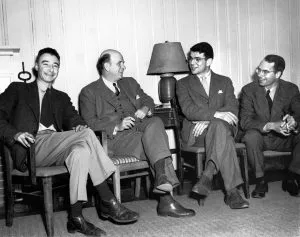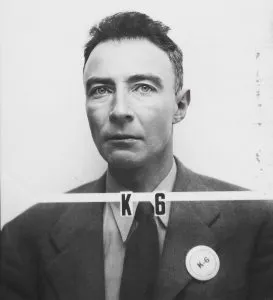[Julius Robert Oppenheimer, born on April 22, 1904, passed away on February 18, 1967. He is famously referred to as the father of the atomic bomb and was the son of Jewish immigrants from Germany. Oppenheimer earned a bachelor's degree in chemistry from Harvard University in 1925 and later obtained a doctorate in physics. He joined the physics department at the University of California, Berkeley, and ascended to full professorship by 1936. Oppenheimer, a chain smoker, often neglected meals while engrossed in his work and battled 
depression for much of his life. After obtaining his Doctor of Philosophy degree in March 1927 at 23, Oppenheimer remained largely uninformed about international affairs, eschewing press consumption and only learning about the Wall Street Crash of 1929 after the fact. He claimed to have voted only in the 1936 presidential election. Like many intellectuals of the 1930s, Oppenheimer supported progressive reforms, a stance considered left-wing during the McCarthy era. He donated three percent of his salary, approximately $100, equivalent to $2,200 in 2022, for two years to aid German physicists residing in Nazi Germany. Oppenheimer's activism extended to hosting fundraisers for the Republican cause during the Spanish Civil War and supporting other anti-fascist initiatives. Despite contributing to leftist causes and associations with individuals affiliated with the Communist Party USA (CPUSA), he never officially joined the party. Upon joining the Manhattan Project in 1942, Oppenheimer admitted on his personal security questionnaire to past involvement with numerous Communist Front organizations. However, he later claimed it was either untrue or an exaggerated jest. 1954, Oppenheimer acknowledged his subscription to the People's World, the Communist Party organ. He affirmed his association with the Communist Movement from 1937 to 1942. He was also part of the Berkeley discussion group, suspected by some as a secret unit of the Communist Party for Berkeley faculty. The FBI initiated a file on Oppenheimer in March 1941, categorizing him under a Custodial Detention index, prompting ongoing debates about his party membership or lack thereof. Historians concur, however, on his firm left-wing inclinations. In 1936, Oppenheimer became romantically involved with Jean Tatlock, daughter of a Berkeley literature professor and a Stanford University School of Medicine student. Tatlock shared some of Oppenheimer's political views and contributed writings to the Communist Party newspaper, Western Worker, in 1939, before their relationship ended in August. President Franklin D. Roosevelt sanctioned the development of an atomic bomb on October 9, 1941, with Lawrence recruiting Oppenheimer into the project the following year. The Manhattan Engineer District was confirmed by the U.S. Army in June 1942, appointing Brigadier General Leslie R. Groves Jr. as its director in September. 
He assembles a team of Rabi, Hans Bethe, and Edward Teller at the Los Alamos Laboratory. At the University of Chicago, he collaborates with scientists Enrico Fermi, Leo Szilard, and David L. Hill. Teller's calculations reveal an atomic detonation could trigger a catastrophic chain reaction that ignites the atmosphere. After consulting with Albert Einstein, Oppenheimer concluded that the chances were low. Teller attempts to leave the project after his proposal to construct a hydrogen bomb is rejected, but Oppenheimer convinces him to stay. After Germany's surrender in 1945, some Project scientists questioned the bomb's relevance. Oppenheimer believed it would end the Pacific War and save Allied lives. The Trinity test is booming, and President Harry S. Truman orders the atomic bombings of Hiroshima and Nagasaki, resulting in Japan's surrender. Oppenheimer is praised while he is obsessed with mass destruction and catastrophe. He indicates his guilt to Truman. The President reprimands Oppenheimer and dismisses his urging to cease atomic development. Oppenheimer's stance as an advisor to the United States Atomic Energy Commission (CAEC) generates controversy. At the same time, the Teller hydrogen bomb receives interest in the middle of the Cold War. AEC chairman Lewis Strauss resents Oppenheimer for publicly dimming Strauss's concerns about producing radioisotopes and for recommending negotiations with the Soviet Union after the Soviets detonated their bomb. Strauss also believes Oppenheimer vilified him during a conversation with Einstein in 1947. In 1959, Strauss secretly orchestrated a private security hearing concerning Oppenheimer's Q clearance before a Personnel Security Board to eliminate Oppenheimer's political influence. However, it became clear that the hearing had a predetermined outcome. Oppenheimer's past Communist ties were exploited, and Groves and other associates' testimony was twisted against him. Teller testified that he lacks confidence in Oppenheimer and recommends revocation. The board revoked Oppenheimer's clearance, damaging his public image and influence on nuclear policy. In 1959, during Strauss's Senate confirmation hearing for Secretary of Commerce, Hill about Strauss's nomination was voted down. In 1963, President Lyndon B. Johnson presented Oppenheimer with the Enrico Fermi Award as a gesture of political rehabilitation. A flashback reveals that Oppenheimer and Einstein's 1947 conversation never mentions Strauss. Oppenheimer instead expresses his belief that they had indeed started a chain reaction- a Nuclear arms race that would one day destroy the world. 
Critical response: Critics have praised Oppenheimer's direction. Richard Roeper of the Chicago Sun-Times gave Oppenheimer four out of four stars and chronicles it as magnificent and one of the best films of the 21st century. The A.V. Club's Matthew Jackson said it was a masterpiece, adding that it was Christopher Nolan's best film so far, a step up to a new level for one of our finest filmmakers, and a movie that burns itself into the brain. Dan Jolin labeled it a masterfully constructed, particularly noting Murphy's performance and Van Hoytema's cinematography. Accuracy: The film is accurate, with some scenes taken out of the book or real-life events that may have happened, such as Oppenheimer not being excited by black holes, as shown in the film. A study released on the day Germany invaded Poland is depicted in the film. As portrayed in the movie, Truman did call Oppenheimer a crybaby. However, in a letter to Dean Acheson one year later, not after meeting Oppenheimer. The scene where Oppenheimer poisons his professor's apple was based on accounts that Oppenheimer gave of the incident, but it is still being determined whether it happened. Strauss had a reason to undermine Oppenheimer's credibility by revoking his Security Clearance, which was because Oppenheimer opposed the development of the hydrogen bomb by the United States. Scott Sagan chronicles the loss of Oppenheimer's influence between the U.S. and the USSR. The Manhattan Project, overseen by General Leslie Groves, which was producing radioactive material that powered the nuclear explosions, also expressed concerns about using the atomic bomb against Japan, according to Kate Gardner. https://en.wikipedia.org/wiki/Oppenheimer_(film) Oppenheimer. (2024, February 27). In Wikipedia. https://en.wikipedia.org/wiki/Oppenheimer_(film)](https://www.opinomail.com/)